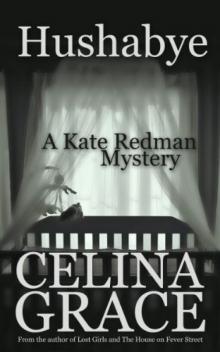- Home
- Celina Grace
Imago Page 2
Imago Read online
Page 2
Now that meetings were held in his office, Anderton was unable to start things off, as he used to do, by crashing through the door like a human whirlwind. He was also clearly unable to pace about as much as he wanted to. It made Kate chuckle inwardly to see him start out with a firm stride only to bring himself up short as he realised the limitations of the space available.
“Right, team, let’s get on. Excuse the by-now-familiar cramped conditions. Anyone know when we move back to the incident room?” No one knew, although Jane tentatively volunteered that it might be next week. “God, let’s hope so. Can’t work under these conditions. Anyway, where were we?”
Anderton came to a stop in front of the much-reduced set of whiteboards that had migrated over to his office during the renovation. Several crime scene photographs were pinned up already, demonstrating the curled shape of the dead woman, one shoe lying beside her pale, dirty foot.
“You’ll be pleased to know that we’re now much further forward than we were this morning – we have ID’d the victim. Amanda Renkin, more commonly known as Mandy Renkin. Twenty-six years old, a known prostitute and drug user. The usual, sad story: chaotic childhood, in and out of care homes. Pregnant at seventeen, baby removed from her care shortly after birth.” Kate flinched, still unable to hear those words without some sort of emotional reaction. Would she ever be able to?
Anderton continued.
“Convictions for soliciting and drug use. Nothing that comes as any great surprise, poor woman.”
“Did she work alone?” asked Olbeck. “I mean, did she have a pimp or something?”
“That’s something we’ll have to find out. We don’t even know if she worked the streets. She may have had a place that she used. Something we need to find out. Talk to some of the usual girls, see if they can tell us anything. Jane, Theo, get onto the CCTV, if there is any in the area. If not, look at what’s nearest, see if you can find anything. Jerry, Rav, if there are any residential areas near the crime scene, talk to people. See if they saw or heard anything.”
Kate raised her hand.
“Shall Mark and I do her address, sir?”
Anderton nodded. “Yep, first thing. See what you can find. Talk to her relatives, talk to her friends, if she had any. Now I’m sure I don’t need to remind you all that the most likely perpetrator in this kind of crime is an ex-partner or even a current partner. Don’t let the fact that she was a prostitute blind you to that. Dig into her background. Did she have a husband or boyfriend? Who was the father of her child?”
Anderton came to the edge of his desk and hoisted himself up, sitting on the edge with his legs swinging. Somehow, the boyish movement went straight to Kate’s heart. Suddenly moved, she blinked and looked away.
That moment, though it had been brief, kept recurring to Kate when she was back at her desk. She had begun the slow, wearisome task of checking her share of the background facts that Anderton had brought up. She’d long been aware of her attraction to her boss and had managed to keep it a secret from him, from the rest of the team and, with surprising success, from herself as well.
She gave herself the usual stern talking to, reciting an inner monologue that pointed out the sad predictability of being attracted to your boss; the foolishness that resulted from such a breach of professional behaviour; and the fact that it could only lead to humiliation, scorn and misery. How pursuing her feelings would be professional and probably social suicide. Staring blankly at her computer screen while the same old words went round and round in her head, Kate could only think one thing: I don’t care. I still want him.
With a massive effort, she shoved those treacherous feelings back down into the depths of her subconscious and turned her attention back to the case.
“Get anything?” asked Olbeck from across the desks.
Kate tapped the keys to print out some data.
“Got an address. Looks like some sort of hostel or something like that. Saint Andrews Mission, Church Road, Arbuthon Green.”
“That’s a homeless charity, I think.” said Olbeck, getting up. He perched himself on the edge of Kate’s desk and she realised he was dressed in a tracksuit. “Catholic. Shall we go and check it out?”
“Yes,” said Kate, standing up. She swung her car keys in an ostentatious circle. “And we’re driving.”
“Fine,” said Olbeck, grinning. “Just means we’ll have to do an extra training session tomorrow. No drama.”
Kate said nothing but suppressed a silent scream.
St Andrews Mission was located in what had obviously once been a village school, Victorian-built, with the usual attention to decorative detail and handsome arched windows. What had once been the playground at the front of the building was now paved over to make space for several cars to park. Kate was pleased to see the old school bell still remained up under the eaves and pointed it out to Olbeck as they got out of the car.
The reception area was painted in industrial green. A low, scuffed table sat by the front desk with a variety of leaflets, advertising counselling services, mother and baby groups, drug and alcohol support groups. A small number of battered chairs stood against the wall, and the reception desk was located behind a glass partition. Behind the reception desk, there was a door with a security key code pad on it.
The grey-haired woman, dressed in a white blouse, who staffed the reception desk looked up as the officers approached.
Kate introduced herself and Olbeck. The woman looked apprehensive.
“Oh yes, we did speak on the phone earlier, I remember,” she said. “I’m Margaret Paling.”
“Do you run this place?” asked Kate.
“Oh no, dear, I’m just one of the volunteers. You’ll need to talk to Father Michael, but he’s out at the moment.”
“We’d like to have a quick chat with you, Mrs Paling, if we may. I understand you knew Mandy Renkin?”
Margaret Paling nodded. She was fingering a rather lovely rhinestone brooch pinned to the lapel of her blouse.
“It’s Miss Paling,” she said. “I’m not married. But I’d be happy to have a chat. Would you like to come through, and I’ll make us some tea?”
Kate and Olbeck were ushered through the security door into a lounge-type area, which sported several worn sofas and armchairs. There was a bookcase with a small selection of second-hand books, a magazine rack stuffed with lots of dog-eared celebrity gossip magazines and a box full of children’s toys.
“We’ll go through to Father Michael’s office,” said Margaret. “The residents aren’t normally up this early, but if you want to talk privately it’s best we use the office.” She saw Kate’s expression. “Oh, I know. Ten thirty in the morning is isn’t very early, but these girls – well, they’re not very disciplined, shall we say. Mind you, having said that, a couple of them are actually in work at the moment, and they’re out, obviously, and the children are in school.”
“Children?” said Olbeck.
Margaret nodded as she opened the door to a small office.
“We have two family rooms here,” she said. “Of course, they’re always in use. In fact, we’re full to the brim at the moment.”
She bustled around, making the tea. Kate had expected to see the usual chipped and battered mugs, milk in a plastic bottle and sugar clumped together in a metal bowl. Instead, Margaret set out a rather nice old tea set, complete with milk jug and dainty sugar bowl. A wisp of steam rose from the spout of the teapot.
“What lovely china,” said Kate. “Royal Doulton, isn’t it?”
Margaret looked gratified.
“That’s right,” she said. “Been in my family for years. May as well get some use out of it.” She looked as though she was about to say more for a moment, but she didn’t. She handed Kate and Olbeck their cups. It had been a long time since Kate had drunk tea from a delicate china cup and saucer. It was good tea, hot and strong.
“You knew Mandy Renkin?” asked Olbeck.
Margaret nodded, fingering her brooch again
.
“I knew her, but not very well. She hadn’t been here long and it seemed as though—” She faltered, looking awkward. “Well, it’s not for me to say, but it did seem as though she might not have been here very much longer. We’re very strict on our no alcohol and no drug use policy here – we have to be – and, well...”
“Mandy was using drugs?” asked Kate.
Margaret nodded again. “I don’t know for sure, but I know that Father Michael had, well, words with her to that very end. They had quite an argument, actually.”
“When was this?”
“I’m not sure. I only heard it about it from someone else, one of the other volunteers. Perhaps two weeks ago? I couldn’t say for sure.”
“We’ll speak to Father Michael when he comes back,” said Kate. “He runs the hostel, then?”
“Yes, he’s the supervisor here. It’s a Church-funded charity.”
Olbeck carefully placed his empty cup back on its saucer and transferred both to what was obviously Father Michael’s desk.
“Could we have a look at Mandy’s room, Miss Paling?”
Margaret looked worried but nodded.
“Yes, of course. I’ll take you there right away.”
“When do you expect Father Michael back?” asked Kate, as Margaret led them back through the sitting room, through another door, along several corridors, across a paved courtyard and finally into another building, a modern block of apartments.
“I couldn’t say for sure. Perhaps after lunch?” Margaret stopped before a door numbered 14. She unlocked it and pushed it open gently.
“This is Mandy’s room.”
Chapter Three
The two officers stepped inside the dim room. The blind at the window was pulled down and the air inside smelt stale. Kate nodded at Margaret in a way she hoped was polite but dismissive.
“Thank you, Miss Paling. We’ll take it from here and come and find you when we’re done.”
“Yes – yes, of course.”
Margaret pulled the door shut behind her as she left. Kate waited until her footsteps had faded from hearing. Then she tossed a pair of gloves to Olbeck.
“Let’s get some light in here, at least.”
Olbeck let the blind roll up with a snap that sounded very loud in the silent room. Kate looked around. The room had an institutional look: grey carpet, patchy woodchip on the walls, a duvet cover in navy blue with a matching pillowcase on the one, thin pillow. Still, she imagined beggars couldn’t be choosers: if it were a choice between this dull but functional room and the streets, Kate knew which she would chose.
Mandy Renkin had only had a few possessions, which was not unusual for someone who was shuttling between B&Bs, homeless hostels and other temporary accommodation. There were some clothes in the little chest of drawers by the window; it didn’t take long for Kate to sort through them. Cheap and badly made, for the most part, although there was one obviously hand-knitted jumper that drew Kate’s attention. She picked it up, noting the cable stitch, the good quality wool. Had Mandy’s mother or grandmother made this for her? Or had she picked it up in a charity shop somewhere? Kate said as much to Olbeck.
“We need to find out about her family,” said Olbeck. “Rav’s digging into her records back at the station.”
Kate nodded. She moved to the small bookcase that stood by the single bed. There were only five books contained therein. Four were romance novels in shabby pink and purple covers. One was an old copy of – Kate blinked and picked it up – Charles Dickens’ Great Expectations. A strange juxtaposition with the other reading matter. Kate turned to the flyleaf of the book and saw the bookplate. Awarded to Amanda Renkin for Excellence in English. The date on the bookplate was twelve years ago. Kate stared unseeing for a moment, picturing the fourteen-year-old Mandy, smart in school uniform, accepting the pristine book from a school Governor, or perhaps the Headteacher. Great Expectations. Thinking of Mandy’s eventual fate, the title was the cruellest possible cosmic joke. How had a smart schoolgirl gone from receiving a school prize at fourteen to dead on the streets at twenty six?
Kate replaced the book on the shelf, carefully. She had these moments in every case, where professional immunity failed. In every case, there were a few moments of pain, brief but excruciating, like a long silver pin being plunged into her heart. She’d told Olbeck that once and he’d said, unexpectedly, I know, it hurts, but it’s good that you feel that, Kate. You know you’re in trouble if you ever stop feeling like that.
Kate sighed, loud enough for Olbeck to look up from his own search. He opened his mouth to ask her what was wrong but shut it again as she shook her head, mutely.
There was a hesitant knock on the door, and Margaret Paling opened it and poked her head tentatively into the room.
“Father Michael is back,” she said. “I’ve let him know you want to talk to him.”
“Thanks,” said Kate. “If you could ask him to come here, perhaps?”
“Yes, of course. One moment.”
They heard the tap of her heels as she walked away back down the corridor. Kate turned her attention back to the small chest of drawers by the bed. There was nothing in the bottom drawer, a jumble of socks and underwear in the middle drawer, and in the top one, several packets of painkillers, crumpled tissues, a half-full cigarette packet and a framed photograph. Kate picked up up carefully. A woman – girl, really – who was clearly Mandy Renkin smiled out at her from the frame. Her cheek was pressed to the face of a baby boy, perhaps three months old or so, toothless mouth open in a drooling, gummy grin. Another of those pins pierced Kate’s heart, and she blinked several times, swallowing hard.
There was another knock at the door.
“I heard you wanted to see me,” said the tall, thin man who entered the room, obviously Father Michael. Olbeck and Kate heaved themselves to a standing position, pulled off their gloves and shook hands, introducing themselves.
Father Michael looked about the room and sighed.
“It’s not much,” he said apologetically. “We’re always short of funds. It’s getting worse now, with the benefit cuts of course. But we do what we can for these girls.”
“I’m sure you do, sir,” said Kate, sizing him up. He was probably younger than she’d first thought, late fifties perhaps, with a soft brown beard tinged with grey and narrow, sloping shoulders. His voice was unexpectedly deep and melodious – she could imagine he preached very well.
“We’re trying to find out as much as we can about Mandy Renkin,” said Olbeck. “Obviously, the more we know about her, the easier it is to find out who might have killed her. What can you tell us about her?”
Father Michael sat down on the edge of the bed and clasped his hands together.
“I hadn’t known her for long,” he said. “She’d not been here for more than a handful of weeks, only a month or so. Her social worker had passed the details of the Mission to Mandy at one of their meetings. Mandy had recently been released from prison, and I think she thought it might be a bit of a fresh start for her.”
“What was she in prison for?”
“I’m not sure exactly. Soliciting or shoplifting or something fairly minor. It was only a short sentence, a matter of weeks.”
“And when she was released she came straight here?”
Father Michael shook his head. “She was briefly in a hostel – a few days or so. I understood that Mandy had managed to complete a drug rehabilitation course in prison. That was why we were able to accept her here. We’re very strict on there being no drugs and alcohol allowed on site and anyone found using or supplying them will be asked to leave.”
Kate nodded. “Yes, Miss Paling said. She also mentioned that you and Mandy had had some sort of altercation recently. Can you tell us about that?”
Father Michael’s rather thick eyebrows rose.
“An altercation?”
“Yes. An argument, a quarrel,” said Kate, deliberately misunderstanding his repetition of the word. “Is
that true?”
There was a moment’s silence.
“Well, I suppose you could call it that,” said Father Michael reluctantly. “I’m surprised at Margaret… There wasn’t really much to tell.”
Kate and Olbeck said nothing. They were skilled in letting the silence spool out for long enough that the person they were interviewing needed then to fill it.
“I found out that Mandy was using drugs again. Or, let me be accurate, I was informed she was using drugs again, and I wanted to hear what she had to say for herself. “
“And what did she say?”
There was a moment’s hesitation, so brief that Kate almost missed it.
“She told me it was a lie. That she wasn’t using drugs again, and she didn’t know who had told me that.”
“Who had told you that?”
“One of the other women here. Claudia Smith.”
Kate saw Olbeck scribble that name down in his notepad.
“Did you believe Mandy?”
Father Michael’s narrow shoulders hunched for a moment. Then he shook his head slowly.
“I’m afraid I didn’t believe her.”
“You believed she was using drugs again?”
He nodded. “You get to know the signs. And I must say, I know very well when someone is lying to me.”
“When did you have this argument?” asked Olbeck.
“Not long ago. Perhaps four or five days ago? I told her she couldn’t stay here if she was using drugs, reminded her of the rules, you know.”
“And how did Mandy react?”
Father Michael sighed.
“I’m afraid she became very foul-mouthed and abusive and ended up slamming the door to her room and locking herself in.”
“I see,” said Kate. “And what happened after that?”
“How do you mean?”
“I mean, how did you react?”
Father Michael half smiled.
“If you mean, was I upset by our argument, then of course I was, a little. But the most important thing about running a charity of this kind is that you have to, at some level, remain detached. Otherwise you just get carried away with the – well, the awfulness of some people’s lives. So, I suppose I mentally shrugged my shoulders and went back to my office.”

 Scimitar (A Kate Redman Mystery
Scimitar (A Kate Redman Mystery Fury: (A Kate Redman Mystery: Book 11) (The Kate Redman Mysteries)
Fury: (A Kate Redman Mystery: Book 11) (The Kate Redman Mysteries) Valentine
Valentine![[Kate Redman 08.5] Joy Read online](http://i1.bookreadfree.com/06/kate_redman_08_5_joy_preview.jpg) [Kate Redman 08.5] Joy
[Kate Redman 08.5] Joy Tasteful (A Kate Redman Mystery Novella)
Tasteful (A Kate Redman Mystery Novella) Hushabye
Hushabye The Hidden House Murders: Miss Hart and Miss Hunter Investigate: Book 3
The Hidden House Murders: Miss Hart and Miss Hunter Investigate: Book 3 A Blessing From The Obeah Man
A Blessing From The Obeah Man Requiem
Requiem Creed (A Kate Redman Mystery
Creed (A Kate Redman Mystery Death at the Theatre: Miss Hart and Miss Hunter Investigate: Book 2
Death at the Theatre: Miss Hart and Miss Hunter Investigate: Book 2 Siren (A Kate Redman Mystery
Siren (A Kate Redman Mystery Pulse (A Kate Redman Mystery
Pulse (A Kate Redman Mystery Imago
Imago The Asharton Manor Mysteries Boxed Set (Books 1 - 4)
The Asharton Manor Mysteries Boxed Set (Books 1 - 4) Descent (A Kate Redman Mystery Novella)
Descent (A Kate Redman Mystery Novella) Snarl
Snarl